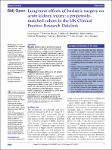Long-term effects of bariatric surgery on acute kidney injury: a propensity-matched cohort in the UK Clinical Practice Research Datalink
Koppe, Uwe
Nitsch, Dorothea
Mansfield, Kathryn E.
Mathur, Rohini
Bhaskaran, Krishnan
Batterham, Rachel L.
Smeeth, Liam
Douglas, Ian J.
Objective: Bariatric surgery is an effective method of weight reduction and has been associated with acute kidney injury (AKI) as a perioperative event. However, the long-term effects of the weight reduction after surgery on AKI are unknown. The objective of this study is to quantify the association of bariatric surgery with later risk of AKI.
Design: This study uses a propensity score-matched cohort of patients from the UK Clinical Practice Research Datalink database with and without bariatric surgery to compare rates of AKI episodes derived from linkage to the Hospital Episode Statistics.
Setting: England, UK.
Participants: We included 2643 patients with bariatric surgery and 2595 patients without.
Results: Results were compatible with an increased risk of AKI in the first 30 days following surgery compared with patients without surgery, but AKI incidence was substantially decreased in patients with bariatric surgery during long-term follow-up (rate ratio 0.37, 95% CI 0.23 to 0.61) even after accounting for chronic kidney disease status at baseline. Over the whole period of follow-up, bariatric surgery had a net protective effect on risk of AKI (rate ratio 0.45, 95% CI 0.28 to 0.72).
Conclusions: Bariatric surgery was associated with protective effects on AKI incidence during long-term follow-up. While the risk of AKI may be increased within the first 30 days, the net effect seen was beneficial.

